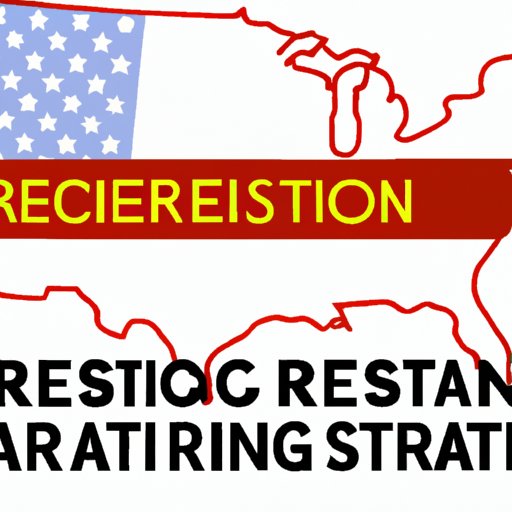
Introduction
There’s no denying that voting is one of the most important things you can do as a citizen. However, in order to vote, you need to register first. For many people, this process can seem daunting or time-consuming. Fortunately, the advent of online voter registration has made it easier than ever before to get registered to vote. In this article, we’ll explore how to register to vote online, the advantages and disadvantages of online registration, what you need to know before you register, and more.
How to Register to Vote Online: A Step-by-Step Guide
The process of online voter registration varies slightly from state to state, but the overall steps are fairly similar. Here’s a general overview of how to register to vote online:
- Visit your state’s election website.
- Fill out the online registration form.
- Upload any necessary documentation (such as a driver’s license or passport).
- Submit your registration.
- Wait for confirmation from your state election office.
It’s important to note that some states require you to have a state-issued ID or driver’s license in order to register to vote online. Additionally, you may need to have a valid email address and internet connection in order to complete the registration process.
If you run into any issues during the online registration process, reach out to your state’s election office for assistance. They may be able to help you troubleshoot any problems you encounter.
The Advantages and Disadvantages of Registering to Vote Online
As with any process, there are both advantages and disadvantages to registering to vote online.
Advantages
- Convenience: Online voter registration is often more convenient than in-person registration, as you can complete the process from the comfort of your own home.
- Accessibility: Online registration may be more accessible for individuals with disabilities, as it eliminates the need for transportation or physical travel.
- Efficiency: Online registration is often quicker and more efficient than in-person registration, as it allows for immediate processing and confirmation of registration.
Disadvantages
- Security concerns: There are concerns around the security of the online registration process, as it may be vulnerable to hacking or other issues.
- Potential errors or glitches: Online registration systems may experience glitches or errors, which could result in incomplete or inaccurate registrations.
Overall, the advantages of online registration tend to outweigh the disadvantages. However, it’s important to be aware of these potential issues in order to ensure a smooth and successful registration process.
What You Need to Know Before You Register to Vote Online
Before you register to vote online, there are several important things you need to be aware of.
Eligibility requirements
In order to be eligible to vote, you must be:
- A U.S. citizen
- At least 18 years old by election day
- A resident of the state in which you are registering to vote
Some states may have additional eligibility requirements, such as a certain length of residency or the completion of a felony sentence. Be sure to check your state’s election website for specific information on eligibility requirements.
Necessary documents
Depending on your state and your individual circumstances, you may need to provide certain documents in order to register to vote online. These may include:
- A valid state-issued ID or driver’s license
- A passport or other form of identification
- Social Security information
Again, it’s important to check your state’s election website for specific information on documentation requirements.
Deadlines and timelines
When registering to vote online, it’s important to be aware of any deadlines or timelines. Some states may have specific deadlines for registration (such as 30 days before an election), while others may allow for same-day registration. Be sure to research your state’s specific rules and deadlines.

The Top States that Allow Online Voter Registration
While online voter registration is becoming more widespread, not all states have implemented it yet. As of August 2021, the following states allow for online voter registration:
- Arizona
- California
- Colorado
- Connecticut
- Delaware
- D.C.
- Hawaii
- Illinois
- Indiana
- Iowa
- Kansas
- Louisiana
- Maine
- Maryland
- Massachusetts
- Minnesota
- Montana
- Nebraska
- Nevada
- New Mexico
- New York
- Oregon
- Pennsylvania
- Rhode Island
- South Carolina
- Utah
- Vermont
- Virginia
- Washington
- West Virginia
- Wisconsin
Be sure to visit your state’s election website for specific information on their online registration process.
The Importance of Voter Registration and Why Online Registration Matters
Voting is a crucial part of participating in a democratic society. By voting, you have a say in who represents you and what policies are enacted in your community. However, in order to vote, you must be registered.
Online voter registration has made it easier than ever before to get registered to vote. By allowing for more convenient and accessible registration options, online registration has the potential to increase voter turnout and engagement.
It’s important to note that online registration is just one option for registering to vote. In-person registration is still available in most states, and may be a better option for individuals who do not have access to the internet or who are not comfortable with online registration.
The Future of Voting: Online Registration and its Impact
Online voter registration is just one piece of the puzzle when it comes to the future of voting. However, it has the potential to make a significant impact on voter turnout and engagement.
By making voter registration more convenient and accessible, online registration can help to remove some of the barriers that prevent individuals from participating in the voting process. Additionally, by streamlining the registration process, online registration can help to reduce the workload on election officials and ensure that registrations are processed quickly and accurately.
However, there are several challenges that need to be addressed in order to ensure the success of online registration. These may include concerns around security, accessibility, and potential errors or glitches. By addressing these challenges, we can work towards creating a system that is both efficient and secure.
Fighting Voter Suppression: How Online Registration is Making a Difference
Voter suppression is a major issue in our society, with many individuals facing barriers to voting due to their race, income level, or other factors. Online registration is just one way in which we can work towards combatting voter suppression.
By making voter registration more accessible and convenient, online registration can help to ensure that more individuals are able to participate in the voting process. Additionally, it can help to reduce the workload on election officials and ensure that registrations are processed quickly and accurately.
There are several examples of how online registration has made a difference in combatting voter suppression. For example, in Arizona, online voter registration has helped to increase voter registration among minority communities. Additionally, other states have used online voter registration to reach out to individuals who may have been previously disenfranchised.
Conclusion
Online voter registration has the potential to make a significant impact on our democracy, by increasing voter turnout and working towards combatting voter suppression. By following the steps outlined in this article, you can get registered to vote online and make your voice heard.




